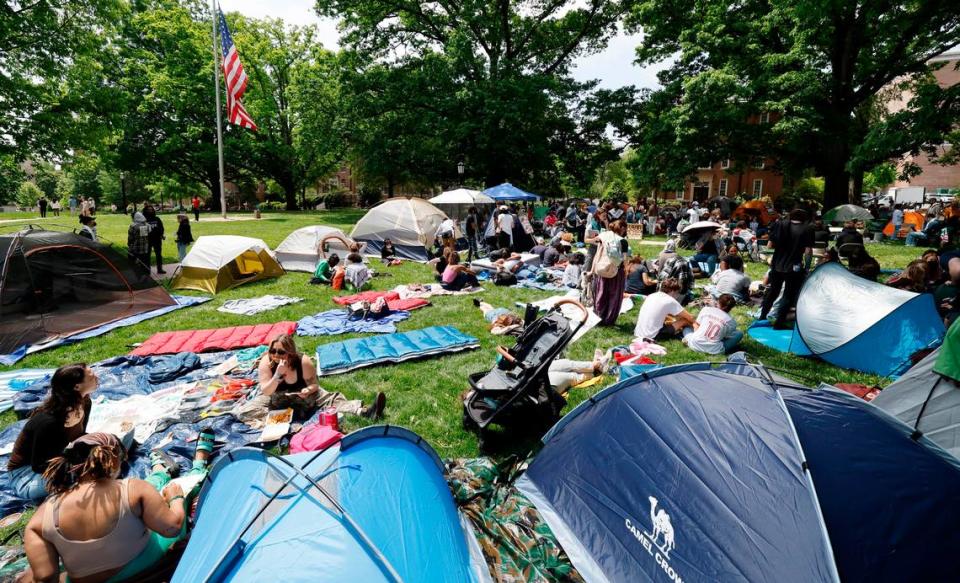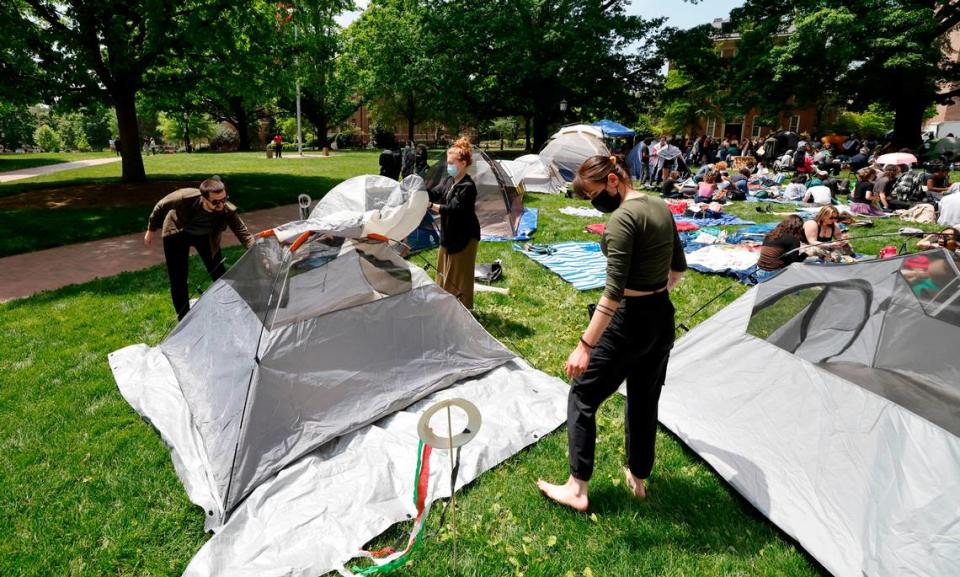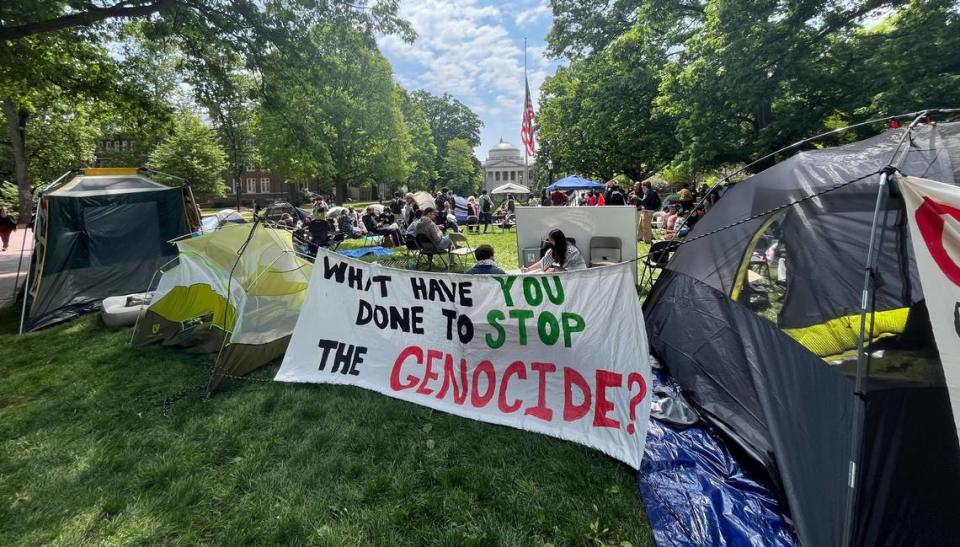UNC students camped out to protest Israel-Hamas war say: ‘We will not be leaving.’
Students and others pitched tents on the campus of UNC-Chapel Hill Friday, calling on the university “to divest from the ongoing genocide in Gaza” and forming an encampment similar to others on college campuses nationwide.
The event, which began around 10 a.m., was organized by the UNC chapter of Students for Justice in Palestine, which has held protests and other events on campus this academic year to support Palestinians as the Israel-Hamas war continues.
“We emphasize that this encampment serves to show solidarity with Gaza, which now has no more universities due to Israeli massacres with US-made bombs. We stand in solidarity with our comrades at Columbia and across the US who have been repressed, arrested, and physically attacked,” the group said in a news release Friday morning, referencing the ongoing protests at Columbia University that have become a flashpoint of pro-Palestinian student activism in recent weeks.

“The central purpose, however, of this encampment is to meet the demands of the present moment, and to center Palestine and call attention to the university’s participation in the genocide in Gaza,” the release stated.
More than a dozen tents and over 100 people filled the middle of Polk Place, the central quad on the main part of campus. The tents were decorated with signs reading “Gaza solidarity encampment” and “free Palestine,” among other sayings.
Friday marked the second time in a week that the group has formed a tent encampment on campus to call attention to their demands. A week earlier on April 19, the group formed a similar encampment before being told by administrators that setting up temporary structures, including tents, on university grounds is prohibited unless approved in advance.

Students on Friday were seen speaking with university administrators Christi Hurt and Desirée Rieckenberg — interim Chancellor Lee Roberts’ chief of staff and the dean of students, respectively — throughout the afternoon, appearing to negotiate terms that would allow the group to remain protesting but to take down their tents.
Friday around 1 p.m., a student organizer announced to the encampment that they had reached an agreement with the administrators to take the tents down by 1:45. The group, which removed the poles from the tents but left the fabric remaining on the ground, planned to remain on the quad at least throughout the afternoon — but likely much longer.
“I just want to say loud and clear, that even though we take the poles out of our tents, we will remain here,” the student organizer said around 1 p.m. “We will not be leaving until the university divests.”
An evening Shabbat service, hosted by Jewish community groups in collaboration with the encampment, was planned for 7:30.
What the students want from administrators
In an Instagram post Friday, UNC SJP outlined its four demands for the university: to “acknowledge the ongoing genocide in Palestine,” to provide “full transparency of UNC investments,” to divest “from companies complicit in this genocide” and to end university study abroad programs to Israel.
UNC SJP said in its news release that students have, since the war began, “asked to meet university administrators to discuss the communities’ demands for disclosing UNC investments and to demand divestment from companies that benefit from Israeli Apartheid and the ongoing genocide in Gaza.”
Sylvie, a UNC SJP member who identified themselves as a graduate student at the university but who did not provide their last name, told The News & Observer that the group has not received such a meeting.
“We have communicated our demands, which have not changed since October, to the administration, who has met us with not only ignorance and negligence, but also, as of recently, threats, discrimination and punishment, which we see as deeply concerning, and reflective of their ideological commitment to upholding the genocidal status quo,” Sylvie said.
At committee meetings of the university Board of Trustees last month, SJP members disrupted the proceedings multiple times with pro-Palestinian chants before being told, including by trustee Dave Boliek, that additional disruptions would result in their arrest. Under state law, anyone “who willfully interrupts, disturbs, or disrupts an official meeting and who, upon being directed to leave the meeting by the presiding officer, willfully refuses to leave the meeting is guilty of a Class 2 misdemeanor.”
At the full-board meeting the next day, Roberts invited the group to nominate a representative to address the trustees and list their concerns. The group nominated Sylvie, who spoke for roughly three minutes. Later, the group again began to chant over the meeting and were escorted out by university police.
Roberts said after the meeting that he “certainly” understands and appreciates the group’s “desire to be heard.”
“Peaceful protest has a long, noble tradition on this campus, on other college campuses in our country, across Western liberal democracies,” Roberts said.
Sylvie said Friday that they didn’t understand the administration’s “strategy” in allowing the group to speak.
“But it didn’t work,” they said. “Because we’re here now.”
The agreement reached between administrators and protesters Friday included only the decision to remove the tents, and did not result in a meeting with Roberts, Sylvie said.
Friday’s events were peaceful, with members of the encampment sharing meals, playing music and gathering for prayer. A group of about 15 to 20 counter-protesters arrived around 2:30 p.m. Several left quickly after speaking with UNC police chief Brian James, while others remained on the quad but at a distance from the encampment.
After the counter-protesters arrived, the members of the encampment began playing music and chanting phrases including “From the river to the sea, Palestine will be free.”
That chant has been a common rallying cry, but the Anti-Defamation League considers it an antisemitic phrase seeking the elimination of Israel and the removal of Jewish people from the area.
Mendy Heber, a rabbi, said he came to campus Friday to support Jewish students.
“I think the Jewish kids need support. I think they feel threatened and I think that [they] feel under siege,” Heber said.
Heber said he believes that the encampment at UNC and the similar ones at universities across the country are “a pretty organized effort to create havoc and make chaos all over,” which he believes protesters could use “as a leveraging point” to get government bodies and other agencies to meet their demands.
Sylvie said of the rally: “This is about freedom. This is about Palestine.”
“This is about humanity and people with consciences who believe that humanity deserves dignity.”



